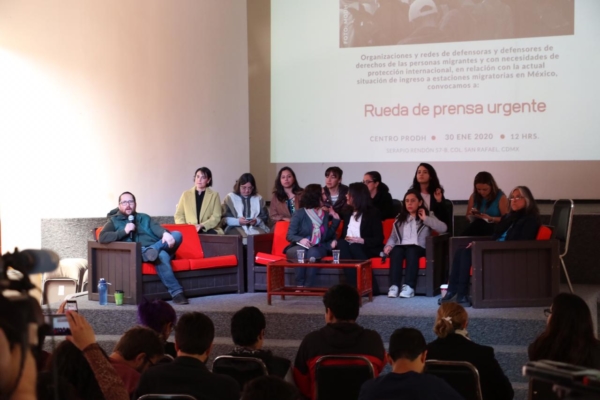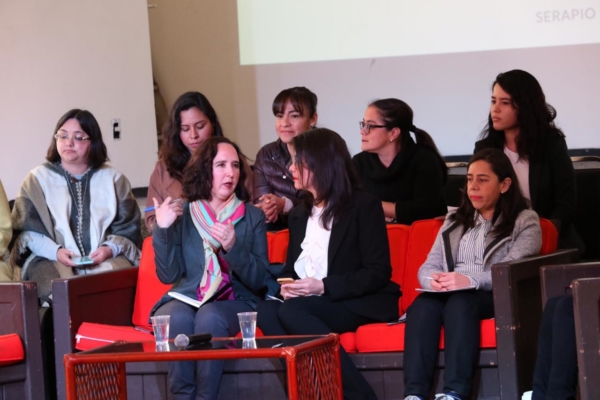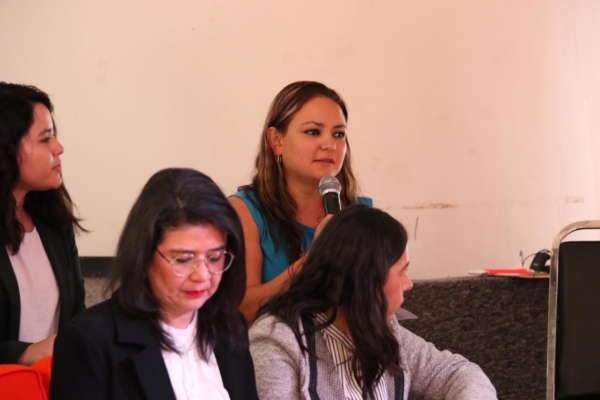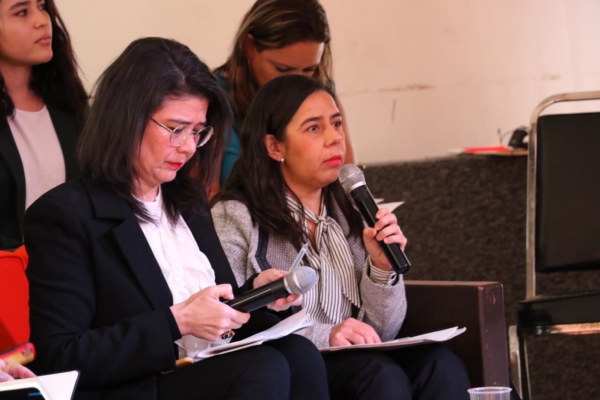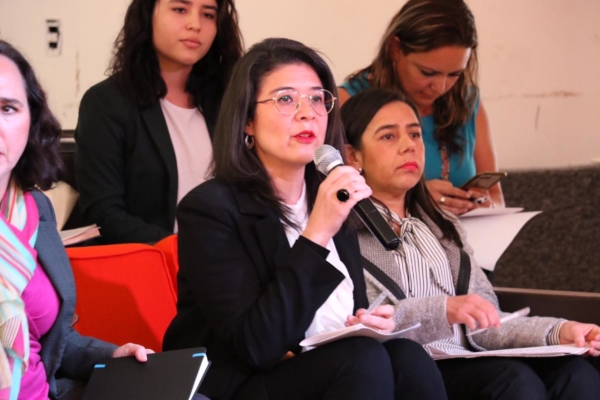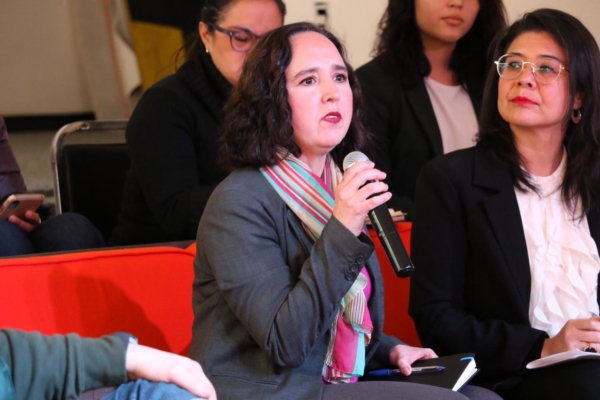- It is unacceptable to prolong even for a day the violation of the rights to access to information, access to justice, and due process of detained migrants subject to international protection.
- The denial of access to migrant detention stations and provisional detention stations is not an isolated action, given that since last year civil society organizations’ requests to renew entry permits have been denied.
- We urge the Mexican State to accept and provide the necessary conditions for the planned site visit by the Inter-American Commission on Human Rights (IACHR) to the northern and southern borders as soon as possible.
Mexico City, January 30, 2020.- The undersigned organizations that defend the rights of migrants in need of international protection express our concern over the recent statements issued by the National Migration Institute (INM by its Spanish acronym) and the Interior Ministry regarding the suspension of access by religious and civil society organizations to permanent and provisional migrant detention stations. We also reject the erratic State policy that systematically violates the rights of the migrant population subject to international protection and seeks to obstruct our right to defend human rights.
Yesterday, the official government document INM/DGCVM/0118/2020 was made public. It announced the temporary suspension of admission to permanent and provisional migrant detention stations for members of religious and civil society associations, until further notice. This announcement comes after a series of prior actions documented since 2017, which is seriously concerning, since it represents an obstacle to the exercise of the right to defend human rights, but especially of the right to receive assistance, accompaniment, and legal representation of the detained migrant population in need of international protection.
In this sense, the undersigned organizations unequivocally reject the various measures that have recently been taken in this regard and reiterate our concern because we reject the notion that this document represents a misunderstanding, as the INM now seeks to assert with its Bulletin 035/2020. This is not an isolated action. We have knowledge of the refusal to renew requested entry permits since last year. This situation, in conjunction with the discourse against civil society organizations that exists at the highest levels of government, alarms us since it implies criminalization of our work.
Regardless of statements by official actors trying to amend the INM’s document, we cannot ignore its existence and the fact that it continues to have legal and practical effects, which not only maintains the entry restriction, but also sets a negative precedent that can be reactivated by the INM at any other moment that it considers a “migrant crisis”, provoking human rights violations like those taking place now. Yesterday, January 29, human rights defenders were denied entry to the majority of migrant facilities across the country.
Furthermore, actions such as the admission of United Nations (UN) agencies to the “21st Century” migrant detention center in Tapachula, Chiapas, to conduct a visit guided by Mexican authorities cannot substitute the systematic, independent monitoring that civil society conducts, which seeks to break through the opacity of the detention centers, guarantee independent scrutiny, and prevent human rights violations.
This set of facts also shows a lack of knowledge of and noncompliance with recommendations by international bodies to the Mexican government regarding violations of the rights to access to information, access to justice, and due process of detained migrants subject to international protection, a situation that is aggravated in cases where legal representation by the organizations affected today by the INM´s policy is not possible.
Therefore, we urgently call on the Mexican government to do the following:
- Accept and grant the necessary facilities for the IACHR´s site visit to the northern and southern borders as soon as possible.
- Abstain from any action that criminalizes and obstructs civil society’s right to defend human rights through independent monitoring work.
- Immediately reactivate access for organizations that conduct monitoring work, accompaniment, and legal representation, without restrictions, by means of a legal act on par with the aforementioned document issued by the INM.
- Eliminate the obstacles to the renewal of entry permits for civil society organizations that have presented requests that comply with all relevant requirements.
- Officially classify the permanent and provisional migrant detention stations controlled by the INM as “places of deprivation of liberty”, and therefore guarantee the standards of adequate treatment of detained persons, including their right to comprehensive legal representation and accompaniment by civil society.
Signatures
Alianza Americas
Alma Migrante, A.C. en Tijuana
Aluna Acompañamiento Psicosocial, A.C.
Asistencia Legal por los Derechos Humanos A.C.
Asylum Access México (AAMX) A.C.
Casa del Migrante en Tijuana A.C.
Casa Monarca Ayuda Humanitaria al Migrante, A.B.P.
Centro de Atención al Migrante Exodus (CAME)
Centro de derechos humanos de las mujeres AC
Centro de Derechos Humanos Fray Francisco de Vitoria O.P, A.C
Centro de Derechos Humanos Fray Matías de Córdova
Centro de Derechos Humanos Miguel Agustín Pro Juárez A.C.
Centro de día para migrantes “Jesús Torres”
Clínica Jurídica Alaíde Foppa para personas Refugiadas
Coalición Internacional contra la Detención
COFAMIDE
Colectivo Contra la Tortura y la Impunidad. A.C.
Colectivo de Monitoreo y Observación Migratoria en Tijuana
Colectivo Michoacán es Diversidad
Comisión Mexicana de Defensa y Promoción de los Derechos Humanos (CMDPDH)
Comité de Defensa Integral de Derechos Humanos Gobixha A.C.
Comité de Familiares de Migrantes Fallecidos y Desaparecidos de El Salvador-COFAMIDE
Comité de Migrantes Desaparecidos del Centro de Honduras -COFAMICENH
Comunicación e Información de la Mujer A.C.
Edith Escareño Granados
Eliana García Laguna
Espacio Migrante, A.C.
Families Belong Together México
Formación y Capacitación A. C.
Foro Nacional para las Migraciones en Honduras
Foro Nacional para las Migraciones en Honduras -FONAMIH
Fundación Étnica Integral
Fundación Arcoíris por el respeto a la diversidad sexual A.C.
Fundación para la Justicia y el Estado Democrático de Derecho A. C. (FJEDD)
Grupo de Monitoreo Independiente de El Salvador, GMIES
Iniciativa Ciudadana para la Promoción de la Cultura del Diálogo, A. C.
Instituto de Geografía para la paz A.C.
Instituto para las Mujeres en la Migración A.C. (IMUMI)
Itzel Checa
Mesa Nacional para las Migraciones y Refugiados en RD
Observatorio Nacional de Crímenes de Odio contra Personas LGBT
ORGANIZACIÓN MEXICO AMERICANA PARA EL DESARROLLO, A.C.
Pax, Acción es Cultura A.C
Programa de Asuntos Migratorios (PRAMI) de la Universidad Iberoamericana Ciudad de México-Tijuana
Red Jesuita con Migrantes Latinoamérica y el Caribe (RJM LAC)
Red Nicaragüense de la sociedad civil para las migraciones
Red por los Derechos de la Infancia en México REDIM
Scalabrinianas Misión con Migrantes y Refugiados (SMR)
Servicio Jesuita a Refugiados México – JRS México
Sin Fronteras IAP
SMR, Scalabrinianas Misión con Migrantes y Refugiados
Uno de Siete Migrando A.C.
Voces Mesoamericanas, Acción con Pueblos Migrantes A.C.
Colectivo de Observación y Monitoreo de Derechos Humanos en el Sureste Mexicano- COMDHSEM
American Friends Service Committee – Oficina Regional América Latina y el Caribe (AFSC), Centro de Derechos Humanos Digna Ochoa, Centro de Derechos Humanos Fray Matías de Córdova, Centro de Derechos Humanos Tepeyac, Centro de Derechos de las Víctimas de la Violencia Minerva Bello, Formación y Capacitación (FOCA), Iniciativas para el Desarrollo Humano, Kaltsilaltik, Médicos del Mundo – España y Francia, Red Jesuita con Migrantes – Centroamérica y Norteamérica, Servicio Jesuita a Refugiados México (JRS México), Una Mano Amiga en la Lucha contra el SIDA, Voces Mesoamericanas – Acción con Pueblos Migrantes.
Grupo de Trabajo sobre Política Migratoria – GTPM
Aldeas Infantiles SOS México, I.A.P.; American Friends Services Committee; Asylum Access México (AAMX) A.C.; Casa del Migrante Saltillo (Frontera con Justicia A.C.); Centro de Derechos Humanos Fray Matías de Córdova, A.C.; Coalición Pro Defensa del Migrante de Baja California; Fundación Appleseed México, A.C.; DHIA. Derechos Humanos Integrales en Acción, A.C.; FUNDAR Centro de Análisis e Investigación, A.C.; IMUMI Instituto para las Mujeres en la Migración; Iniciativa Ciudadana para la Promoción de la Cultura del Diálogo, A.C.; INSYDE Instituto para la Seguridad y la Democracia; M3 Movimiento Migrante Mesoamericano; REDIM Red por los Derechos de la Infancia en México; Save The Children México, Sin Fronteras, IAP; Servicio Jesuita a Migrantes México; SMR Scalabrinianas: Misión para Migrantes y Refugiados; Leticia Calderón, Analista en temas migratorios; Brenda Valdés; Elba Coria; Manuel Ángel Castillo, Investigador; IDC International Detention Coalition (Observadoras). Claudia Martínez Medrano, Jocelín Mariscal Agreda y Melissa A. Vértiz Hernández, Secretaría Técnica.
Grupo Impulsor contra la Detención Migratoria y la Tortura – GIDMT
American Friends Service Committee (AFSC) – Oficina Latinoamérica y el Caribe, Casa del Migrante de Saltillo, Centro de Derechos Humanos Fray Matías de Córdova, FM4, Paso Libre, Grupo de Acción Comunitaria (GAC), Inclusión y Equidad Consultora Latinoamericana, Instituto para la Seguridad y la Democracia (INSYDE), Servicio Jesuita a Migrantes (SJM), Servicio Jesuita a Refugiados México (SJR) y Voces Mesoamericanas – Acción con Pueblos Migrantes.
Mesa de Coordinación Transfronteriza Migraciones y Género – MTMG
Capítulo Guatemala
American Friends Service Committee, Oficina Regional para América Latina y El Caribe (AFSC); Asociación Comunitaria Multisectorial de Monitoreo Comunitario en Salud y Apoyo a Migrantes (ACOMUMSAM); Asociación Consejería Oxlajuj Ix para Centroamérica y México (CAMEX); Asociación Coordinadora Comunitaria de Servicios para la Salud-Guatemala ACCSS; Asociación de Desarrollo Social de Ixcán (ADESI); Asociación de Familiares de Migrantes Desaparecidos de Guatemala (AFAMIDEG); Asociación Lambda, Consejo de Juventud para el Desarrollo Ixcoyense (COJDI); Comisión de Asuntos Migratorios de Ixcán -CAMI; Comité Municipal de Migración; Equipo de Estudios Comunitarios y Acción Psicosocial (ECAP); Federación Guatemalteca de Escuelas Radiofónicas (FGER); Gobierno Ancestral Plurinacional Q’anjoba’l; Jóvenes por el Cambio; Mamá Maquin; Médicos del Mundo Francia – España; Mesa Nacional para las Migraciones en Guatemala (MENAMIG); Molanil K´inal B´e; Pastoral Social La Libertad Cristo de Esquipulas; Pop Noj’; Red Juvenil Ak´Molam; Sociedad Civil.
Capítulo México
American Friends Service Committee, Oficina Regional para América Latina y El Caribe (AFSC); Centro de Derechos Humanos Oralia Morales; Centro de Derechos Humanos Fray Matías de Córdova; Coalición Indígena de Migrantes de Chiapas (CIMICH); Comité de Derechos Humano Fray Pedro Lorenzo de la Nada A.C.; Formación y Capacitación A.C. (FOCA); Iniciativas para el Desarrollo Humano A.C.; Instituto Mexicano para el Desarrollo Comunitario (IMDEC); Instituto para las Mujeres en la Migración AC (IMUMI); La 72, Hogar – Refugio para Personas Migrantes; Médicos del Mundo Francia – España, Pastoral de Migrantes; Parroquia de Frontera Comalapa; Servicio Jesuita a Migrantes (SJM); Servicio Jesuita a Refugiados (SJR), Servicio Pastoral a Migrantes San Martin de Porres (SEPAMI – SMP ); Una Ayuda para ti Mujer Migrante A.C.; Voces Mesoamericanas, Acción con Pueblos Migrantes, A.C.
Red de Documentación de las Organizaciones Defensoras de Migrantes REDODEM:
Abba A.C. CCIAPM; Albergue Decanal Guadalupano; Albergue Hermanos en el Camino; Albergue Monseñor Guillermo Ranzahuer González; Albergue y Dormitorio San José, Casa de la Caridad Hogar del Migrante; Casa de la Esperanza San José; Casa del Caminante Jtatic Samuel Ruiz García; Casa del Migrante Casa-Nicolás; Casa del Migrante de San Juan de Dios; Casa del Migrante El Samaritano; Casa del Migrante Hogar de la Misericordia; Casa del Migrante San Carlos Borromeo; Casa del Peregrino Migrante; Casa Tochan; Casa de Acogida, Formación y Empoderamiento de la Mujer Migrante y Refugiada, CAFEMIN; Centro de Apoyo Marista al Migrante, CAMMI; Centro de Derechos Humanos Juan Gerardi A.C. / Centro de Día para Migrantes Jesús Torres; Centro de Orientación del Migrante de Oaxaca, COMI; Dignidad y Justicia en el Camino A.C. FM4 Paso Libre; Programa Casa Refugiados A.C.; Servicio Jesuita a Migrantes México; Uno de Siete Migrando, A.C.
Red Nacional de Organismos Civiles de Derechos Humanos
“Todos los Derechos para Todas y Todos”
(conformada por 86 organizaciones en 23 estados de la República mexicana):
Academia Hidalguense de Educación y Derechos Humanos A.C. (ACADERH) (Hidalgo); Agenda LGBT (Estado de México); Alianza Sierra Madre, A.C. (Chihuahua); Aluna Acompañamiento Psicosocial, A.C.(Ciudad de México); Asistencia Legal por los Derechos Humanos, A.C. (AsiLegal) (Ciudad de México); Asociación Jalisciense de Apoyo a los Grupos Indígenas, A.C. (AJAGI) (Guadalajara, Jal.); Asociación para la Defensa de los Derechos Ciudadanos “Miguel Hidalgo” (Jacala Hgo.); Bowerasa, A.C. “Haciendo Camino” (Chihuahua, Chih.); Casa del Migrante Saltillo (Saltillo, Coah.); Católicas por el Derecho a Decidir, A.C. (Ciudad de México); Centro de Capacitación y Defensa de los Derechos Humanos e Indígenas, Asociación Civil (CECADDHI) (Chihuahua); Centro “Fray Julián Garcés” Derechos Humanos y Desarrollo Local, A. C. (Tlaxcala, Tlax.); Centro de Apoyo al Trabajador, A.C. (CAT) (Ciudad de México); Centro de Derechos de la Mujeres de Chiapas (San Cristóbal de Las Casas, Chis.); Centro de Derechos Humanos “Don Sergio” (Jiutepec, Mor.); Centro de Derechos Humanos “Fray Bartolomé de Las Casas”, A. C. (San Cristóbal de Las Casas, Chis); Centro de Derechos Humanos “Fray Francisco de Vitoria O.P.”, A. C. (Ciudad de México); Centro de Derechos Humanos “Fray Matías de Córdova”, A.C. (Tapachula, Chis.); Centro de Derechos Humanos “Juan Gerardi”, A. C. (Torreón, Coah.); Centro de Derechos Humanos “Miguel Agustín Pro Juárez”, A. C. (Ciudad de México); Centro de Derechos Humanos de la Montaña, Tlachinollan, A. C. (Tlapa, Gro.); Centro de Derechos Humanos de las Mujeres (Chihuahua); Centro de Derechos Humanos de los Pueblos del Sur de Veracruz “Bety Cariño”, A.C. (Tatahuicapan de Juárez, Ver.); Centro de Derechos Humanos Digna Ochoa, A.C (Tonalá, Chis.); Centro de Derechos Humanos Paso del Norte (Cd. Juárez, Chih.); Centro de Derechos Humanos Toaltepeyolo (Orizaba, Veracruz); Centro de Derechos Humanos Victoria Diez, A.C. (León, Gto.); Centro de Derechos Humanos Zeferino Ladrillero (CDHZL) (Estado de México); Centro de Derechos Indígenas “Flor y Canto”, A. C. (Oaxaca, Oax.); Centro de Derechos Indígenas A. C. (Bachajón, Chis.); “Centro de Estudios Sociales y Culturales Antonio de Montesinos, A.C.” (CAM) (Ciudad de México); Centro de Investigación y Capacitación Propuesta Cívica A. C. (Propuesta Cívica) (Ciudad de México); Centro de Justicia para la Paz y el Desarrollo, A. C. (CEPAD) (Guadalajara, Jal.); Centro de los Derechos del Migrante (Ciudad de México); Centro de Reflexión y Acción Laboral (CEREAL-Guadalajara) (Guadalajara, Jal.); Centro Diocesano para los Derechos Humanos “Fray Juan de Larios”, A.C. (Saltillo, Coah.); Centro Juvenil Generando Dignidad (Comalcalco, Tabasco); Centro Kalli Luz Marina (Orizaba, Ver.); Centro Mexicano de Derecho Ambiental (CEMDA) (Ciudad de México); Centro Mujeres (La Paz, BCS.); Centro Regional de Defensa de DDHH José María Morelos y Pavón, A.C. (Chilapa, Gro.); Centro Regional de Derechos Humanos “Bartolomé Carrasco”, A.C. (BARCA) (Oaxaca, Oax.); Centro Universitario por la Dignidad y la Justicia Francisco Suárez, S.J. (CUDJ)(Guadalajara, Jal.); Ciencia Social Alternativa, A.C. KOOKAY (Mérida, Yuc.); Ciudadanía Lagunera por los Derechos Humanos, A.C. (CILADHAC) (Torreón, Coah.); Colectivo contra la Tortura y la Impunidad (CCTI) (Ciudad de México); Colectivo Educación para la Paz y los Derechos Humanos, A.C. (CEPAZDH) (San Cristóbal de Las Casas, Chis.); Comisión Ciudadana de Derechos Humanos del Noroeste (Mexicali, Baja California); Comisión de Derechos Humanos y Laborales del Valle de Tehuacán, A.C. (Tehuacán, Pue.); Comisión de Solidaridad y Defensa de los Derechos Humanos, A.C. (COSYDDHAC) (Chihuahua, Chih.); Comisión Regional de Derechos Humanos “Mahatma Gandhi”, A. C. (Tuxtepec, Oax.); Comité Cerezo (Ciudad de México); Comité Cristiano de Solidaridad Monseñor Romero (Ciudad de México); Comité de Defensa de las Libertades Indígenas (Palenque, Chis.); Comité de Defensa Integral de Derechos Humanos Gobixha A.C. (CODIGODH) (Oaxaca, Oax.); Comité de Derechos Humanos “Fr. Pedro Lorenzo de la Nada”, A. C. (Ocosingo, Chis.); Comité de Derechos Humanos “Sierra Norte de Veracruz”, A. C. (Huayacocotla, Ver.); Comité de Derechos Humanos Ajusco (Ciudad de México); Comité de Derechos Humanos de Colima No Gubernamental A. C. (Colima, Col.); Comité de Derechos Humanos de Comalcalco, A. C. (CODEHUCO) (Comalcalco, Tab); Comité de Derechos Humanos de Tabasco, A. C. (CODEHUTAB) (Villahermosa, Tab); Comité de Derechos Humanos y Orientación Miguel Hidalgo, A. C. (Dolores Hidalgo, Gto.); Comité de Familiares de Detenidos Desaparecidos “Hasta Encontrarlos”(Ciudad de México); Comité Sergio Méndez Arceo Pro Derechos Humanos de Tulancingo, Hgo A.C. (Tulancingo, Hgo.); Consultoría Técnica Comunitaria AC (CONTEC) (Chihuahua); El Caracol, A.C (Ciudad de México); Estancia del Migrante González y Martínez, A.C. (Querétaro, Qro.); Frente Cívico Sinaloense. Secretaría de Derechos Humanos (Culiacán, Sin.); Fundación para la Justicia y el Estado Democrático de Derecho (Ciudad de México); Indignación, A. C. Promoción y Defensa de los Derechos Humanos (Mérida, Yuc.); Instituto de Derechos Humanos Ignacio Ellacuria, S.J. Universidad Iberoamericana- Puebla (Puebla, Pue.); Instituto Mexicano de Derechos Humanos y Democracia (Ciudad de México); Instituto Mexicano para el Desarrollo Comunitario, A. C. (IMDEC) (Guadalajara, Jal.); Justicia, Derechos Humanos y Género, A.C. (Ciudad de México); La 72, Hogar-Refugio para Personas Migrantes (La 72) (Tenosique, Tabasco); Mujeres Indígenas por la Conservación, Investigación y Aprovechamiento de los Recursos Naturales, A. C. (CIARENA) (Oaxaca); Promoción de los Derechos Económicos, Sociales y Culturales (PRODESCAC) (Estado de México); Proyecto de Derechos Económicos, Sociales y Culturales (ProDESC) (Ciudad de México); Proyecto sobre Organización, Desarrollo, Educación e Investigación (PODER) (Ciudad de México); Red Solidaria de Derechos Humanos, A.C. (Morelia, Michoacán); Respuesta Alternativa, A. C. Servicio de Derechos Humanos y Desarrollo Comunitario (San Luis Potosí); Servicios de Inclusión Integral, A.C. (SEIINAC) (Pachuca, Hgo.); Tequio Jurídico A.C. (Oaxaca, Oax.); Uno de Siete Migrando A. C.(Chihuahua, Chih.); VIHas de Vida (Guadalajara, Jal.); Voces Mesoamericanas, Acción con Pueblos Migrantes AC (San Cristobal de las Casas, Chiapas).
Red Nacional de Apoyo a personas migrantes y refugiadas LGBT México
San Aelredo A.C., Programa Compañeros, Centro de Orientación e Información de VIH/SIDA A.C., Amigos Potosinos en Lucha Contra el Sida A C., Colectiva Chamanas CIFAL A.C., Irapuato Vive A.C., Colectivo Michoacán es Diversidad, LYOR, Tendremos Alas A.C., Colectiva Luna Celaya, Buscador de sueños, Una mano amiga en la lucha contra el sida A.C., COCUT Comunidad Cultural de Tijuana LGBTI A.C., Red + Posithiva de Quintana Roo, ODESYR Observatorio Ciudadano de Derechos Sexuales y Reproductivos A.C., Amaruss Guendanavanii Ixtepec, Colectiva Gunaa Rucaalu, Inclusión Sinaloa, Club Gay Amazonas, VIHDHA A.C., Integración Social Verter A.C., Sonora Pride, Servicios de Inclusión Integral y Derechos Humanos, Alianza Mexicana de Trabajadoras Sexuales y Fundación Arcoíris por el Respeto a la Diversidad Sexual
Relevant Precedents
- For twenty years, some of the aforementioned organizations have conducted monitoring actions inside migrant detention centers. Through this work, we have documented the precarious conditions of detained migrant persons subject to international protection, as well as providing information about migratory procedures, rights and, in particular, the right to apply for asylum.
Accordingly, we have provided legal representation to hundreds of people, who otherwise would not have requested recognition of their refugee status, nor had the legal representation necessary to challenge any denial decisions.
In the same vein, our labor has shed light on the recurring practice of detaining children and adolescents, a fact that contributed to the development of the corresponding sections in the General Law of the Rights of Children and Adolescents and its regulations that prohibit their detention.
- The migrant detention stations have been considered places of deprivation of liberty by UN bodies, the Inter-American Human Rights System, and by the General Law to Prevent, Investigate and Punish Torture. Accordingly, the UN Committee Against Torture, the Subcommittee on the Prevention of Torture, the Working Group on Arbitrary Detention, the Special Rapporteur on Torture, the Special Rapporteur on the Human Rights of Migrants, and the UN High Commissioner for Refugees, have insisted on the need for all migrant detention stations to be permanently monitored by civil society, given its preventive effect against violations of detained persons’ human rights.
- The Inter-American Commission on Human Rights, in its Resolution 04/19, established the Inter-American Principles on the Human Rights of all Migrants Refugees, Stateless Persons and Victims of Human Trafficking, which call for all Organization of American States (OAS) member States to guarantee “the availability of independent and autonomous monitoring mechanisms and authorize the access of civil society organizations and international bodies to detention centers, with the aim of monitoring detention conditions, and even guarantee access to all facilities within the places of deprivation of liberty; access to information and documentation related to the establishment and the persons deprived of liberty; and the possibility of conducting private and confidential interviews with persons deprived of liberty and with the personnel.”

